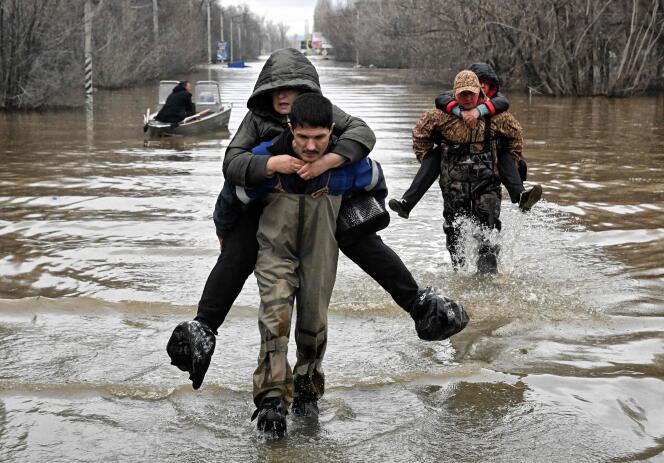


In Orsk, the second-largest city in Russia's Orenburg region, the worst is yet to come but the situation is already "critical," according to the authorities. With the flood peak expected around Wednesday, April 10, more than 10,000 homes are already underwater, the worst tally in this area for a century.
The Siberian regions of Tyumen, Kurgan and Samara on the Volga, are also affected or threatened by rising waters. The first two declared a state of emergency on Monday, April 8. In neighboring Kazakhstan, President Kassym-Jomart Tokayev called it "the worst [floods] in 80 years." The assessment is the same everywhere. Adverse weather conditions are compounded by snow and ice melting, which have been particularly abundant and rapid in 2024, with a sudden rise in temperatures.
In Orsk, home to 220,000 residents, the situation deteriorated when the dams protecting the town from the flooding of the Ural and Or rivers were compromised. Entire districts were submerged in just a few hours. Images filmed by official television channels and by residents show individual houses submerged up to their roofs in muddy water. Drinking water is in short supply and hospitals have suspended some activities.
On Monday, another dam burst at the village of Lesotorgovy, the third since Friday. The extent of the flooding far exceeds the failure scenarios envisioned by the authorities, according to documents reviewed by the exiled media agency Agenstvo.
The city of Novotroitsk and the regional capital, Orenburg, were also affected over the weekend, and the peak has not yet been reached there either. Across the region, where a federal state of emergency has been declared, 6,000 people have so far been evacuated from 77 localities, with the help of volunteers. Four deaths were initially reported but the authorities denied their connection to the floods.
However, the region's inhabitants' distrust can be seen on social media. Anger is directed at the Minister for Emergency Situations Aleksandr Kurenkov, who explained on television that evacuation instructions had been issued a week before the floods, but that the population refused to believe them. Three days before the dams broke, however, the mayor of Orsk reaffirmed that there was no threat to these structures. Moreover, evacuations only really began a few hours before the disaster.
There are also questions surrounding the dams' construction and maintenance. Since their inauguration in 2010 and 2015, the courts had investigated fraudulent use of funds, before ruling in favor of the builder. On Monday, April 8, the investigating committee initiated proceedings for negligence and violations of safety regulations.
You have 19.86% of this article left to read. The rest is for subscribers only.
